When reports of failing infrastructure and water-related safety concerns start becoming the order of the day, you might begin to wonder… What can I do about it? As a professional water company, it's usually one of the first questions we get asked these days. The exciting news is that we believe there is a whole new era of growth just ahead for America and for water and for the first time ever it's an opportunity you can get in on! Find out how here in the replay.
Transcript from recording
Opening
Estrella: You can be a part of the clean water revolution. The government is failing to take care of our water with outdated infrastructure, lack of funding and just plain neglect. We are going to revolutionize this trillion dollar industry with incredible technology, innovative financing and expertise that will help water users clean, recycle and transform the state of water, all powered by incredible investors who can participate in the potential benefits.
I am so thrilled to announce that OriginClear's Water on Demand initiative is now open to investors. Who wouldn't want to help us change the world while creating a potential revenue stream that will last for generations. With your help, we are solving the problem that stagnated the water industry for decades. Capital. We are the water fintech of the future and we're here right now. Join the Clean Water Revolution. Find out more at www.WaterOnDemand.Net.
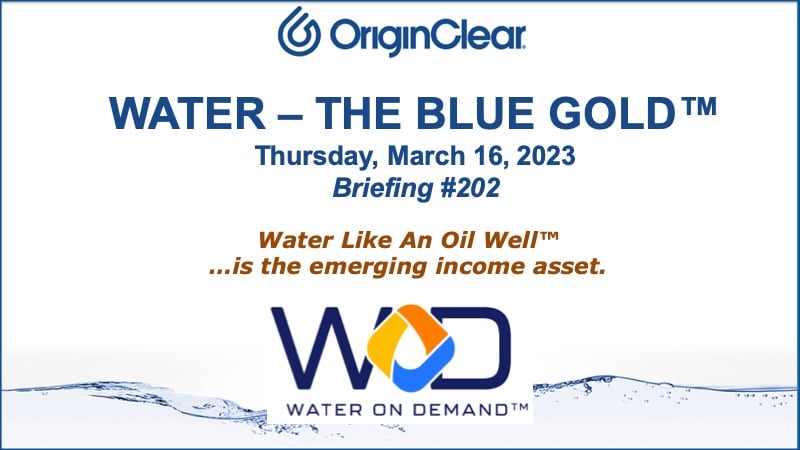
Introduction
Riggs: Well, that is a beautiful thing. Beautiful thing. All right. So, I'm actually traveling, so I'm on a laptop webcam, but it seems to be doing okay, so I'm going to get going here. And Water is the Blue Gold™. March 16th and it's briefing number 202. Welcome aboard, everyone. I see people are still arriving. It looks like a good crowd.
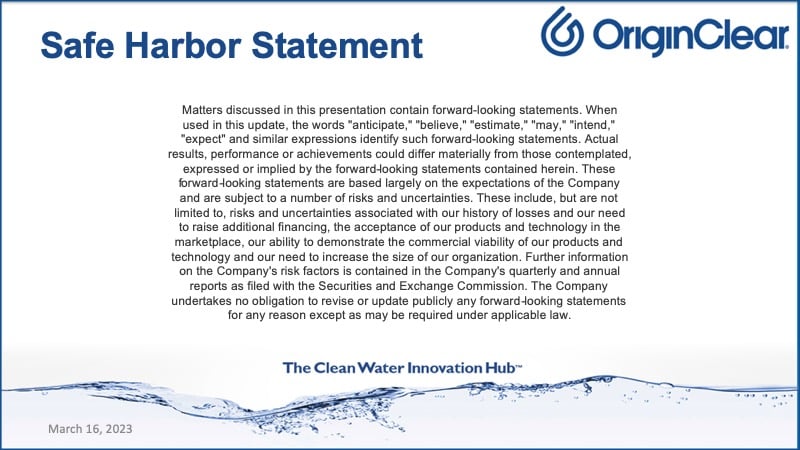
The usual disclaimers.
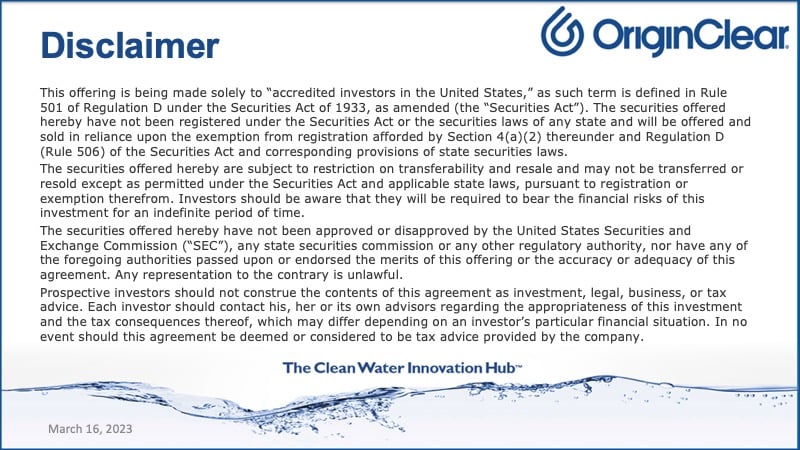
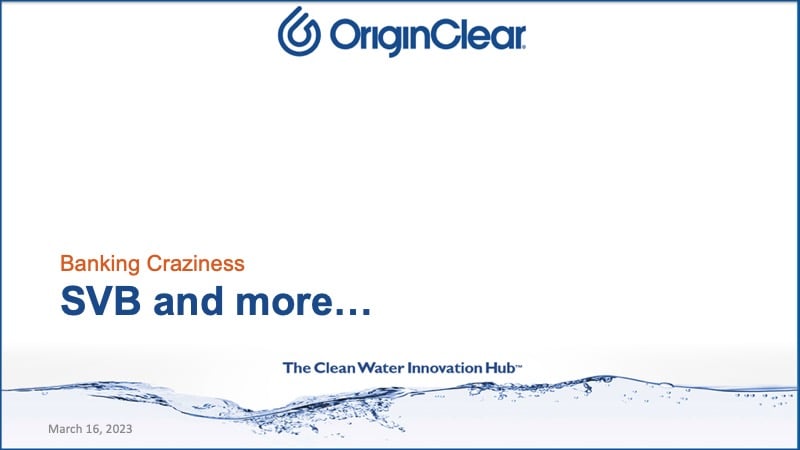
Eugene Tully, "Looking good." All right. Appreciate it when people like how I look. All right, so what about this SVB stuff? Lord have mercy. Have we been hearing noise about that? right? It seems that if you're a giant high tech company, you get bailed out. That's apparently the reality of it. But let's take a closer look here.

This is a comment about the monetary system. In the last year, the European Central Bank created an anti-fragmentation tool, whatever that means. The Bank of Japan, who became the largest owner of its own government debt, the Bank of England, rescued UK pension funds from collapse and the US Treasury emergency backstopped all bank depositors insured and uninsured both. And we're to believe this is a normal and healthy banking system. Monetary system? Well, I don't think so.
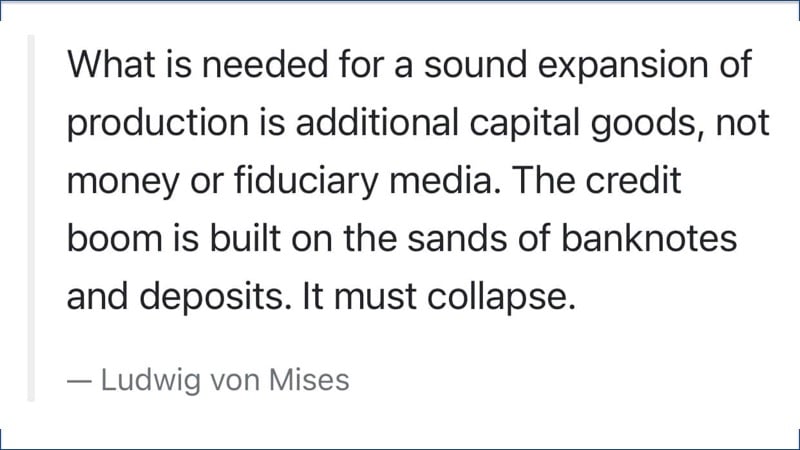
Let's go back to the good old Austrian school of Economics. What is needed for a sound expansion of production is additional capital goods, not money or fiduciary media. The credit boom is built on the sands of banknotes and deposits. It must collapse.
Of course, we're in the category of additional capital goods. Water On Demand is the new water asset. And so we are not relying on printed money or what's called fiduciary media, which I think is money held in trust, basically. And you can have one, let's say, one party holds what the other party has and they both can claim the same thing kind of thing. Right? It's kind of crazy.
Anyway. Ludwig von Mises was the one of the leaders of the Austrian School of Finance, and his predictions are coming true. So you want to be an asset. And that's why we're happy, very happy with where we are now.
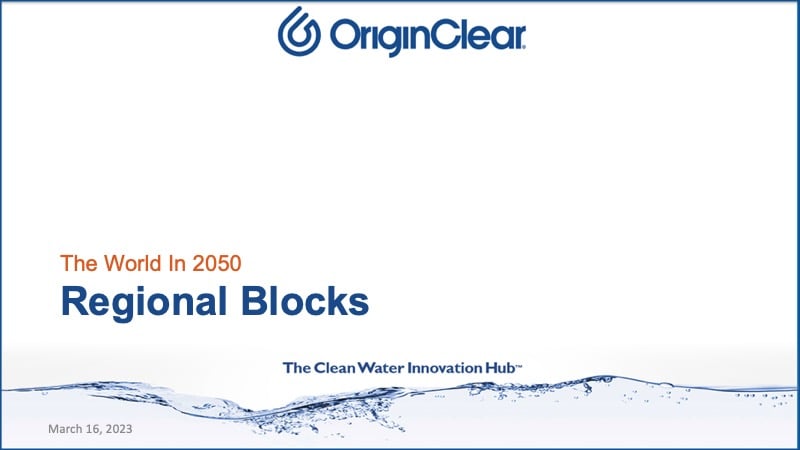
Let's take a look. There's a very good map here that I thought was interesting, you know, that I've been displaying Peter Zeihans philosophy about how Deglobalization is going to create regional blocks. Because North America is such a strong regional bloc, it's going to create a huge boom as manufacturing is brought back in to the United States and Mexico and Canada. Mexico is very important because that's the source of cheap labor, well-educated, cheap labor that's right next door, democratic country.
They have their problems with the cartels. Of course, we know that. But it's still better than dealing with China right now. What it means is that we're going to have a manufacturing infrastructure boom for the next 25 years. What does that mean? That means that these are going to be brand new modern factories and assembly plants built. And because of the speed of this expansion, centralized water treatment will not be possible. These will have to be integrated with their own water treatment systems, as we're seeing with a lot of large players already, you know, chip fabrication plants, things like that. They all have their own water treatment. That is trickling down into the general population of businesses.
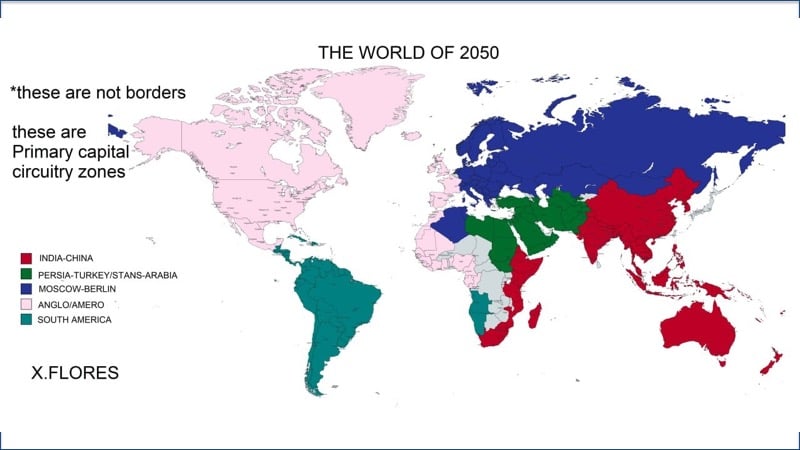
Capital Circuitry Zones
So let's take a look at this little prediction here. These are primary capital circuitry zones. What this writer and you can look in Telegram under X.Flores, that's his channel. He's got North America and he's included Western Europe, not Germany, but UK, France, Spain, Portugal and the entire western shore of Africa, which is very important because a lot of the petroleum and gas now that Russia is closed off, will be coming into France via its possessions. Well, not its possessions, but it's its zones of influence in West Africa.
Then we have Persia, Turkey, the Stans and Arabia being a major bloc. And I think that's coming about and includes, of course, Iran. Then we have Moscow and Berlin and check it out. This is what Washington, D.C., has been trying to avoid, which is the the unification of the economic unification of Russia with Berlin and the Nordic countries. And according to this writer, this is where it's going.
Then we have India and China. And of course, they have really a lot of presence in Eastern Africa. And finally, we have South America, which is a very interesting group. So these are perhaps the future regional blocs. We'll see how it plays out. I'll see you in 2050, right? Okay. Quick interview. A little excerpt of an interview I did. Let's check it out.
Start of presentation
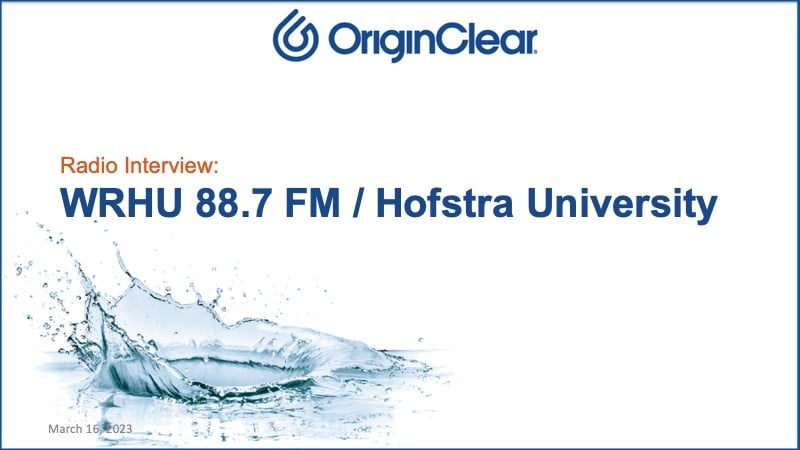
Cody: All righty. Thank you so much. I'm joined by Riggs Eckelberry, CEO of Clear Origin. Thank you so much for joining me today. Mr. Eckelberry.
Riggs: It's such a great pleasure, Cody. And we at OriginClear are super, super focused on what's going on in in America's water infrastructure.
Cody: That's amazing. Now, looking into the issue in East Palestine, it appears that it's the vinyl chloride going straight into the aquifer. I'm wondering how does that impact the area? Long term, I know we're seeing reports from people in the EPA that there's acid rain even in West Chester, New York, out here. I'm wondering if you could tell us a little bit more about that.
Riggs: Yeah. Well, really, the issue is that the East Palestine aquifers, first of all, they are broad and they flow downstream. Right? So we have two problems here. Vinyl chloride, as you know, is very permeable. It permeates really easily into the underground. And unfortunately, it doesn't disappear quickly. And it also converts into things that are even more toxic. You know, you've heard about, you know, potential conversion to phosgene and to dioxin.
Dioxin sort of being the last molecule for all these transformations, ends up being dioxin, which is very, very persistent. In my opinion, what we have here is a situation where we're going to have to have point of use water treatment everywhere. We're just we're just going to have to bite the bullet. The central water treatment system is breaking down because now, by the way, I think that the utilities in the area of East Palestine and so forth, they're doing a good job.
They're not failing on the job. It's just that they can only do so much. There's a really, really good website which your listeners can go to, which is ewg.org/tapwater. Environmental working group.org/tapwater. Put in your zip code and you'll find out exactly what your municipality cleans for and what it should be cleaning for. Now, most municipalities are compliant with the law, but the law has fallen behind the times.
And so what we have is a situation where the cities like, "Hey, I'm doing what the law says. What do you expect from me?" It's like, well, more is needed. Unfortunately, it's not going to happen centrally. It's going to have to happen at the point of use. We at OriginClear are focused on the 90% users of water, which is industrial and agriculture, because those are the first of all, they're the ones creating all the toxins and secondly, they're the ones overwhelming the utilities. So what we're doing these days is we're helping businesses move off of the central system and onto their own water treatment.
And I believe at the end of the day, we're all going to have to do that. And I think that what's ended up happening over time is that the responsible parties are going to have to go ahead and help the people in East Palestine and elsewhere treat their own water. At the end of the day, it's all we can do. Look, they tried for years with Flint, Michigan, to fix the problem with the pipes and so forth at the end of the day. A whole home system in every home is what you have to do. Now it's expensive, but at this point, we have to recognize that irreparable damage is being done.
Cody: Right. And I know, like I myself have used the EWG's looking up my local municipality. Nassau and Suffolk County, is known for its water contaminants and with ability like correlation with increased breast cancer rates here on the island. So I'm wondering, um, what can consumers use in terms of testing for those additional contaminants that maybe municipalities aren't looking for?
Riggs: All right. Well, I think you just got to fast forward straight to the remedy. Right. You can test all you want, but at the very least, I believe that consumers should use a good gravity fed water filter, those big silver units. You know, Berkeley is one brand. There's others. And what they use is they use a carbon, black carbon filter, very efficient. It does a really good job. The Brita filter, things like that. They're okay. I'm not going to say they're bad, but I think really these days you need to go to the next level, which is these black carbon filters as a minimum. They're. You know, it's a couple hundred dollars, but you put it on your counter and that's what you use.
Now, in addition, I recommend that people put a shower head that can handle things all the way down to a very small molecule. And what I'm talking about is the roundup molecule, glyphosate, which is very small and does not come out easily. And there is, you know, a shower head that I was recommended by my holistic doctor. And it's, I believe it's called the pro one. I'll give you the exact name for your listeners. And I'll bring it right, right here. Pro one pro max shower filter. So the pro and pro max, I personally obviously have no stake in it and I can't vouch for it, but my doctor by name told me, Riggs, go get that.
So number one, get the gravity fed water filter for your kitchen counter for all your drinking water needs, including your pet. Don't let your pet drink from the toilet. Secondly, your shower. Those are the two major areas because your body absorbs a lot of toxins through the skin. When you're taking a shower. So if you're doing those two things, you're in pretty good shape. Now, in addition, what we did in our home is we we installed an under-sink reverse osmosis system. That's the next level up. They're not that expensive, six, $800.
And now the water coming out of that little, that little specialty faucet on your sink, it has nothing, takes everything out. And then we in our home, we invested in a whole home system that took things down to 0.2 microns, which is pretty good. It takes care of, for example, of some of the larger polymer molecules, but it doesn't, it doesn't go all the way down to the very smallest. But at that point, you're just talking about just general cleaning the house kind of stuff, you know, which at some point you need to relax. So as long as you take care of what you take in through your mouth and what goes into your skin, you're in good shape.
Cody: Yeah. And I know OriginClear mostly deals with agricultural and industrial sectors. Do you know if there's any assistance being provided to residents in East Palestine and surrounding areas in terms of emergency funds to add those filtration systems or any of those products to household level consumers?
Riggs: Cody, you and I now know that the reaction has been underwhelming, to say the least. And I'm not exactly sure why, but I think we have inattention to these issues. But I think that's changing quickly. You know, we've had some some very, Erin Brockovich showed up, right? That was super important. Former President Trump showed up. That I think is is, obviously he was barnstorming, but it helps.
And then, you know, I think, I think we need to just keep up the pressure. We need to keep pushing. There's some kind of attitude about flyover states that we've got to get rid of in this country, right? These are people, too. And why don't they get same as people in New York or LA? Come on. It's like it's a bit strange.
So I think it's just, I don't think it's conscious even. I don't think people are like, you know, I hear a lot of conspiracy theorists, like, well, they're just trying to kill all the Trump supporters. I don't think that's the fact. I think it's just an attention. It's just a cultural thing. So, um, I think it needs to come back to haunt, um, you know, the government and they're doing a lot of minimization of the problem. Obviously the railroad is trying very hard to avoid being hit hard with this.
I also want to add another thing, why it happened in the first place, because we have very degraded infrastructure. I don't know if you've seen the clips of a freight train trying to go down the tracks. It's like. My five year old used to put it together better, better trains. I mean, come on. And what it is, is just decades of neglect.
Now we're seeing that in water. The water infrastructure in this country has a accumulated deficit of $1 trillion, literally since 1961. They have avoided the, everyone really has avoided like a great system was put in place and then it wasn't maintained. Now we can't, trillion dollars is too much to make up. So what do you do instead? You start solving it at the point of use.
So the solution to all this is to just take direct action and to on our level, for example, commercially to help these businesses treat the water themselves. You know, one good thing is, that I believe very strongly that, what's been going on as a long term geopolitical issue, which is basically deglobalization. I don't know if you've ever listened to Peter Zeihan. He's, he was on Joe Rogan. He talks about 200 times a year. Very smart, smart guy. And one thing he says is, you know what? We're going to bring all the industry back to America.
Places like East Palestine actually will do well in the end because that's where all the industry will come back to. It can't come back to LA. It has to come back to the Rust Belt where it came from. So this will, you know, the return of manufacturing to America will do a lot of good for these regions. And so that means money will flow. But it also means that there won't be time to build giant central water plants again. Those take decades to build.
So we're going to have to have in place water systems, decentralized water systems wherever these new plants are put up. And we have to insist on it. So I think that we just need to be aware of the fact that the water is not great, that that we need to take action ourselves, even if it's inexpensive. We need to push for government, you know, FEMA and so forth to help out because it's just as bad as a hurricane. And we need to also be aware of the spread of these toxins through all the watersheds.
Cody: All right. Thank you so much for joining me, Riggs. Now, if our listeners want to learn more about OriginClear or anything else around this issue, do you have any resources you recommend checking out?
Riggs: Absolutely. I first of all, just to do a little self promo every Thursday night, I do a CEO briefing. I'm up to 199 right now, weekly CEO, briefings since on Zoom, since Zoom existed. And what we do is we go over all these issues and it's, I think, really interesting. So just go to originclear.com and you'll be able to, you're invited right away to join my briefings. Please join me. And it's interactive. Comments get made, I address them. It's really interesting. And then like I say educate yourself on ewg.org. I think it's very important. And also remember that you know all action is local. Participate at your at your town hall level. You know, you can make a difference right there in your city and county.
Cody: All right. Well, thank you so much for joining me. That was Riggs Eckelberry, CEO of OriginClear. Thank you so much for joining me.
Riggs: It's my pleasure, Cody. Thank you.
Cody: All right. Have a good night.
End of presentation
Audience Participation
Riggs: Well, that was a good interview. And now I have to put my AirPods back on. And Keith Roeten, "Deglobalization has to happen if we are to flourish as a strong independent country. By the way, Ken looks alive today." All right. Okay. Bob Roos, "Promax. I bought it through Amazon." So the promax shower head but "https://prooneusa.com/pro" is what Bob has suggested. Scott Norris, "Let's just do a Reader's Digest version of this." Well, thank you, everyone, for your patience.
Freewheeling Discussion
Okay. Well, with that, we are going to jump into the freewheeling interview. So let's, my co-hosts can jump on and let's start discussing. Ken, you did a fine job of surviving.
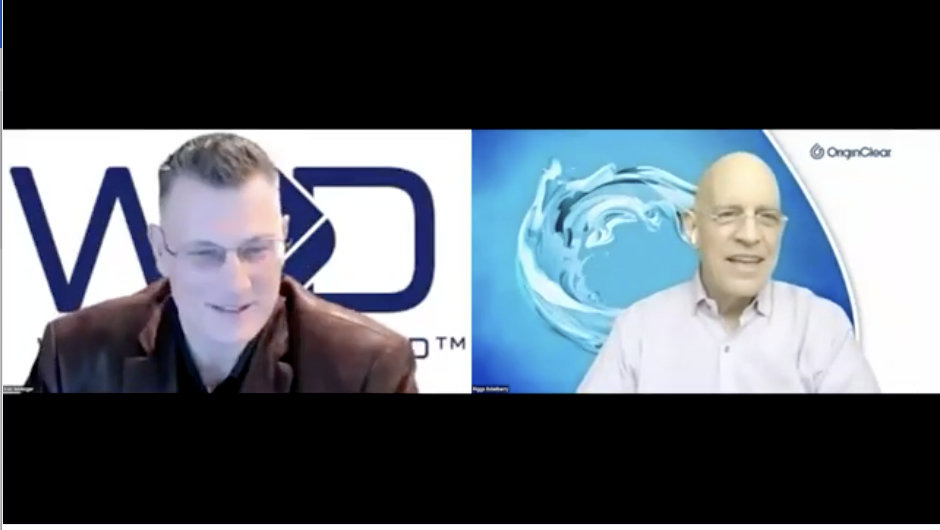
Ken: Ad libbing. Yes. Can you hear me okay?
Riggs: Yeah, I can hear you fine. Can you hear me?
Ken: Okay. I can hear you well. I mean, you know, you have the airpod thing going, but, you know, we're so spoiled by that nice microphone you have, right?
Riggs: Yeah, I know.
Ken: And, Keith, thank you for pointing out I look alive. It's amazing when you have the lights on, you know, and people can see you. You look okay. So while you were down, it's so funny. Because I hadn't really I hadn't heard that interview, but I actually started to touch on the topics that you ended up talking about.
About the Monetary System
All right, So this week's banking news combined with the absolutely hellish state of infrastructure, both here and around the world, really, it lays to bare, it lays bare open what our real problems are, right?
We don't, we don't really have a stable monetary system, as Ludwig von Mises pointed out, right? We've been borrowing from ourselves for decades. And then we have a vital resource that's necessary for all life on Earth being horribly neglected to the point where it's no longer safe to consume. And the thing, I hate to say this, but it was almost providential that we came out with this idea because you're literally creating an asset that could stabilize people's wealth, built over time against this weakening dollar.
You know, when I heard the news that SVB was going to get backed. Don't worry about it. If you have $50 million on deposit, well, that's uninsured. We'll back it anyway. Now, you have signature bank that folded. They're going to be, they're going to be bailed out. First Republic looks like they're in trouble and may have to be bailed out. And then you've got, of course, Credit Suisse. Credit Suisse lost $8 billion last year. So between those four entities, you've probably got, what, dozens of trillions of dollars?
And the governments of the world are just going to, and I love it when they say, don't worry, the taxpayers aren't going to pay for it. Okay, all that means is they're going to print the money. Well, folks. If you're rich or if you're wealthy, that impacts you a lot. If you're middle class or poor, it's devastating. It's absolutely devastating. When you blow up the money supply for people who are barely making ends meet, when a loaf of bread goes from $4 to $6. Kids don't have bread. Okay. So so very cruel tax on the poor.
Riggs: I want to, I don't want to go completely.
Ken: I'm getting off my soapbox now. Okay.
Riggs: You're, we're being black pilled like crazy, so I understand. What I think the point we're trying to make here is for anybody who's got money to invest, it's very hard to deal with currency type instruments, equities and so forth. And this is why we keep harping on this, which is Water On Demand capital asset, which is why we are if you look in the news section of OriginClear, I'm not allowed to discuss it. There's a whole bunch of announcements relating to what we're doing and that is very, very strategic.
So I think that moving to a commodity based finance system in the world is going to be very painful. But at the same time there will be new ways for people to survive and that will be through investable assets. All right, Estrella, are you are you available?
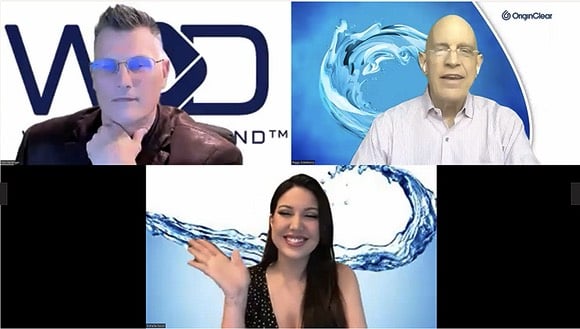
Estrella: Yes, I am.
Riggs: Welcome aboard. And, you know, I'm glad that the Internet came back so that we could have you here because, Lord have mercy. It was not fun. It was not fun.
Estrella: Short commercial break. Just a little commercial break.
Ken: Good thing the mic was down during that thing. Otherwise we'd have had a treat, I'm sure.
World Water Day
Riggs: So, yeah, let's talk quickly about what's happening next week. We have World Water Day on the 22nd. I'm arriving on the 21st. I have interviews in the morning of the 22nd. Apparently I'm with a financial network called Cheddar live in New York on Tuesday morning, Wednesday morning I guess it is. And then that evening we're doing an event with you, Estrella and Ken. This trio is going to be hanging out and telling the world all about what's happening with water.
And that's going to be at a place called Neuehouse. It will be announced. So you will have the address. Neuehouse in New York and we should have a lot of fun with it. So mainly, we want to start a tradition. It's going to be a small event to start with. The following morning we are being interviewed, all three of us, at the New York Stock Exchange. So that's going to be fun.
So what are we going to talk about? Well, of course, Water On Demand and Estrella has been an amazing spokesperson for that. And we'll be recording all that and using the material in our promotions. Our crowdfunding has gotten off to a great start. We have, you know, five figures of investments in already and that's going really well. So we're very happy with it. Just go to oc.gold/blue and that will take you straight to it.
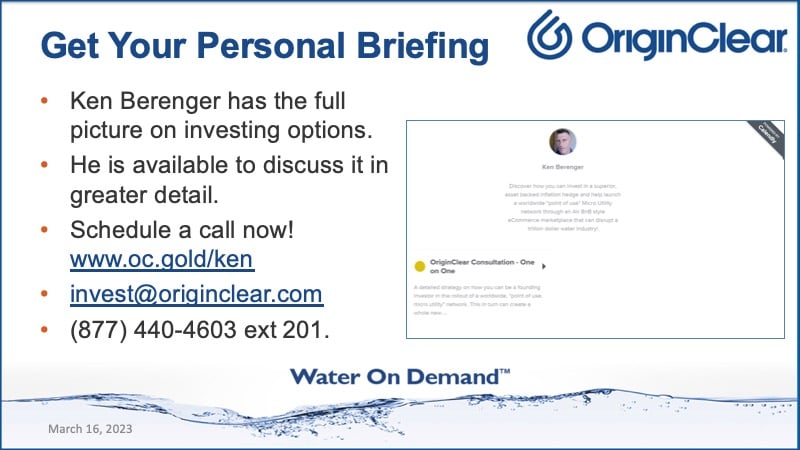
Call Ken
And then I wanted just to give the contact information for Ken, because if you're credited and you're interested in what's happening in background, then you definitely want to see what's going on. You have to sign a non-disclosure is what I'm getting at. So we will get that done.
Ken: It's worth the non-disclosure. It's, it's really, it's compelling and exciting and it's certainly worth signing the NDA because very, very good inside information.
Riggs: All right. Well, you know, we're about there. I had another piece, but it's going to take too long because the interruption we had. So it's going to be for next week on the Play Hard podcast. Very, very good interview. And of course, we hope to have some footage from the event as well. Some some quick footage. So thank you, everyone. It's been a great pleasure. Sorry again for the interruption and really appreciate everyone hanging in there. Have a great weekend. And we'll be reporting next week. Do join us.
Ken: Good night, folks.
Estrella: Okay, good night, guys.
Riggs: Thank you, Tom Liakos. And we're out.
%20250px.png?width=250&height=53&name=OriginClear%20Logo%202019%20(RGB)%20250px.png)



